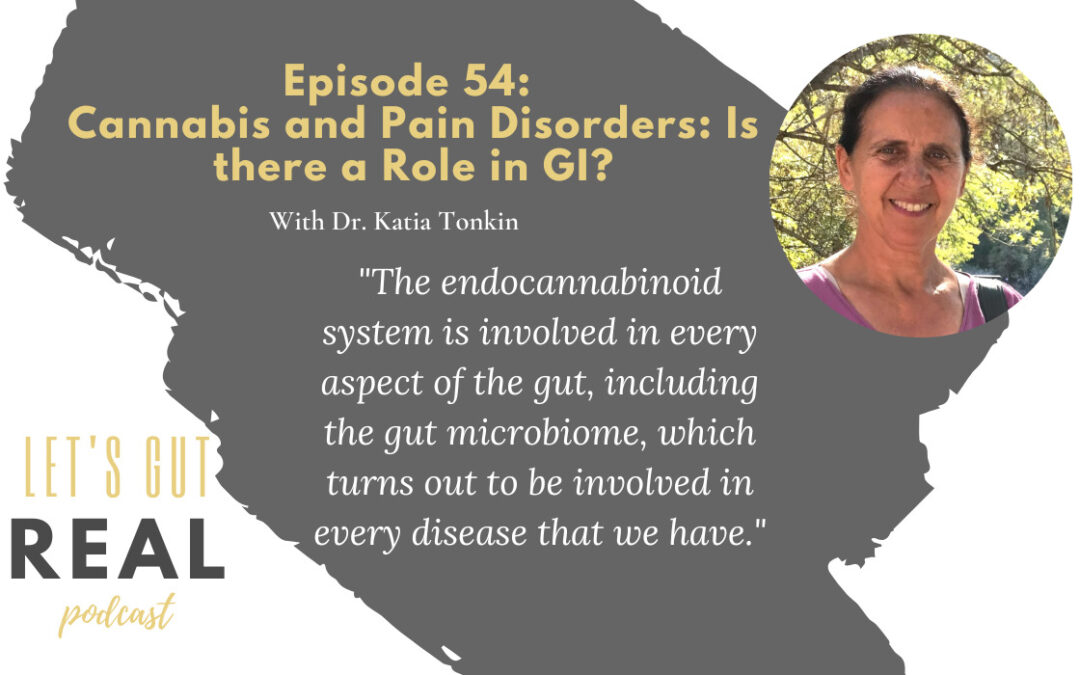The endocannabinoid system naturally exists in every single part of your body. It exists in your brain, in your nervous system, in your gut, in your liver, and in your immune system. This week I interview Dr. Katia Tonkin on the role that cannabis plays in medical care and GI conditions.
Nutrition Pearls for Cannabis and Gut Health:
- The most common reason that physicians prescribe cannabis is for pain. The next most common reason is for anxiety and depression.
- The endocannabinoid system is involved in every aspect of the gut including the gut microbiome.
- Plant drugs like cannabis contain over a hundred cannabinoids including the commonly known THC and CBD. It also contains terpenes which can have varying health effects (like causing drowsiness), and flavonoids which are the different flavours.
- Some of the minor cannabinoids may have highly significant impacts in disease processes – but we don’t know enough about them yet.
- IBS, migraines, and fibromyalgia are three diseases that are probably related to a natural deficiency of the endocannabinoid system. For some patients, not everybody, small doses of cannabis may be helpful.
- The way that cannabis is taken influences the way that it is absorbed and how it’s going to be effective.
- Each patient responds differently to cannabis, so a medical prescriber is essential to be able to know which strain and dose of cannabis is right for which patient.
- It is important to note that the higher the THC, the more likely it will exacerbate your anxiety.
- Some healthcare providers may still have a stigma around cannabis due to its previous schedule 1 drug classification.
- The bottom line with cannabis is that it has some good and some bad elements and may not be the right choice for everyone.
Pain is a predominant feature in the majority of functional gut disorders. The higher risk of anxiety and depression when coping with any chronic illness, including GI disorders, as well as anxiety and depression impacting symptoms and symptom perception in many GI conditions are all very important aspect of medical care.
This week I interview Dr. Katia Tonkin on the role that cannabis plays in medical care – including in the treatment of anxiety, depression, and pain.
Dr. Tonkin is a medical oncologist who worked at The Cross Cancer Institute in Edmonton Alberta Canada for 20 years and in London, Ontario Canada for 6 years prior to that. She became interested in medical cannabis in 2016 as many patients started asking about cannabis. After researching into it, Dr. Tonkin felt cannabis was likely to help many patients with a wide variety of problems. She started treating patients in April 2017 and wants to contribute to clinical research to further medical knowledge into appropriate uses of medical cannabis, as well as educating health care providers on the proper use of cannabis. She works out of Optimum Wellness Center as well as other clinics as a medical prescriber.
We talk about:
- Tonkin’s background as a clinician and how they became interested in the role cannabis plays in medical care.
- What cannabis is.
- The components of the plant that have therapeutic impacts.
- The role of a medical prescriber.
- How cannabis, that is medically prescribed, differs from cannabis you might find in stores and why ’self medicating’ is not the best strategy to realize the benefits of cannabis
- The conditions we have evidence for using cannabis with (including anxiety, depression and pain)
- How these overlaps with gastrointestinal disorders.
- How to find a medical prescriber.
Connect with Dr. Katia Tonkin at Optimum Wellness Centres in Edmonton, Alberta.



Recent Comments